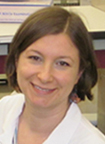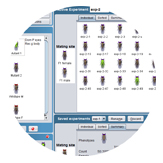 Dr. Ayce Yesilaltay
Dr. Ayce Yesilaltay
Title: Curriculum development efforts for an inquiry-based introductory lab course or can we have it all?
Group Meeting Date & Time: Thursday, July 24, 2014 @ 2:00 pm
View the slides from Dr. Yesilaltay’s Group Meeting
Ayce Yesilaltay is an Instructor for Curriculum Development in the Biology Department at MIT where she develops curriculum for and teaches the MIT course 7.02, Introduction to Experimental Biology and Scientific Communication. In her talk titled “Curriculum development efforts for an inquiry-based introductory lab course or can we have it all?”, Dr. Yesilaltay spoke about the challenges of developing curriculum for a multi-faceted, communications-intensive, inquiry-based introductory lab course.
MIT course 7.02 is an 18 unit, introductory biology laboratory course that is required for MIT biology majors. The course is a writing intensive course and also serves to fulfill a communications requirement for undergraduates at MIT. The only prerequisite course for 7.02 is introductory biology (MIT course series 7.01x).
The course consists of three modules: genetics, biochemistry, and chemical engineering. Dr. Yesilaltay and the rest of the teaching team set about to redesign the genetics curriculum first. The teaching team knew that the newly redesigned curriculum had to fit within the constraints of the course, including the course’s demographics, setup, and learning goals. First, while the course is intended for sophomores, only a third of the students are actually sophomores, with the majority being juniors. As a result, the course consists of a wide demographic of students with varying levels of laboratory experience and biology content knowledge. Second, the course is setup as a mixture of 1-hour lectures twice a week, 4-hour laboratory sessions twice a week, and 1-hour writing sessions once every two weeks. The newly designed curriculum and laboratory components would need to fit within the timeframe allotted to students, especially the laboratory and lecture components. Lastly, the new curriculum needs to enhance the overall learning goals of the course, which are to become proficient in (1) experimental techniques, such as performing experiments, troubleshooting experiments and writing in a lab notebook, (2) data analysis, (3) scientific communication, and (4) experimental design.
The goals of the new module were to build a laboratory curriculum that (1) fits in with the genetics concepts the students learn, (2) is a cohesive, hypothesis-driven series of experiments with an overarching goal, (3) provides students with decision making opportunities, and (4) has potential opportunities for novel discoveries. To work with these goals, the teaching team decided to use the yeast mating signaling transduction pathway as the scientific basis for the new genetics curriculum. The yeast mating pathway, which is a well-studied pathway with many reagents available to the teaching team and links to cancer, provides opportunities for the students to perform several different experimental techniques and processes, including a genetic screen, selection of mutants, PCR, sequencing, and BLAST sequencing analysis. The laboratory components provide numerous opportunities for students to have project ownership in the development of their own library of mutants, decisions about mutant selection, and the potential identification of novel genes.
The new curriculum was launched for the first time in fall 2013 and students have already identified a potentially new gene, KCC4, involved in the pathway. Dr. Yesilaltay has also assessed the student’s experience with the new curriculum using the MIT provided online evaluations and her own pen and paper evaluations. She has found the paper evaluations to be a more effective means of obtaining feedback as the response rate is higher, questions are personalized to the course and curriculum, and open-ended questions can be asked. The results indicate that the new curriculum was very successful overall. Students reported that their least favorite parts of the genetics module were long lab days, broken pipettes, and too few spectrophotometers, all of which were addressed prior to spring 2014 implementation. The students’ favorite parts were the functional assays, determining the identity of their mutated gene, and visualizing yeast. In addition, Dr. Yesilaltay was able to assess that student’s comfort level increased across all types of the genetics experimental techniques.
At the end of her talk, Dr. Yesilaltay commented that the new genetics curriculum with set experiments and opportunities for student ownership creates a nice medium between cookbook style and open-ended labs. In addition, the new genetics curriculum provides a nice balance between sufficient coverage and depth of the most important genetics concepts and experimental techniques. Perhaps Dr. Yesilaltay and her teaching team have found it all!
Speaker biography
Ayce Yesilaltay is an Instructor for Curriculum Development in the Biology Department at MIT where she is currently developing curriculum for and teaching the MIT course 7.02, Introduction to Experimental Biology and Scientific Communication. Dr. Yesilaltay received her Ph.D. in Molecular Genetics and Microbiology at the University of Massachusetts Medical School. As a postdoc and later as a research scientist at the MIT Biology Department, Dr. Yesilaltay pursued her interests in understanding the pathophysiology of high cholesterol, infertility and atherosclerosis. During this time, Dr. Yesilaltay enjoyed mentoring several high school, undergraduate and graduate students in the lab and for the Howard Hughes Summer Research Program and received a mentoring award from the MIT Biology Department. Dr. Yesilaltay designed, taught and guest-lectured courses at MIT (7.343- A Love-Hate Relationship: Cholesterol in Health and Disease and 7.20- Human Physiology) and at Suffolk University (CHEM334- Biochemistry II/Intermediary Metabolism and CHEM 332- Molecular Biochemistry).



